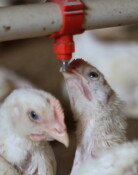[Editorial] Free Lunch?
Free meals at public schools are a hot topic of debate ahead of the June 2 local elections. Several candidates from opposition parties running in Gyeonggi Province have pledged to allocate budget to provide free public school meals. A ruling party candidate preparing to run for Seoul mayor has announced a similar plan for the citys elementary schools.
No parent would oppose free meals for students, so the fear is that all candidates in mayoral and school superintendant elections could rush to make the pledge. The first to spark debate over the topic is Kim Sang-gon, head of the Gyeonggi Provincial Office of Education who was elected last year through assistance from the progressive Korean Teachers and Educational Workers Union. He submitted late last year a budget plan for supplying free meals to all fifth and sixth graders to keep his campaign pledge, but was rejected. He then submitted Tuesday a revised plan on giving free meals to all public school students in the province in phases by 2014. Kim sought to promote his reelection bid with the plan despite knowing that it will not pass the provincial council.
Providing free meals to all of the estimated 1.93 million public school students in the country will cost 661.2 billion won (580 million U.S. dollars) per year. Doing so for Seouls 598,000 elementary school students alone will cost 258.7 billion won (225 million dollars), and expanding the free meal program to the citys 954,000 middle schools will cost 431.8 billion won (380 million dollars). The figures also exclude the hundreds of millions of dollars required to build food service facilities. Gyeonggis annual educational budget is 8.2 trillion won (seven billion dollars) while Seouls is 6.3 trillion won (5.5 billion dollars). Seventy to 80 percent of the budgets are restricted costs, including teachers salaries, so the remainder will go to free meals. It is so obvious that this policy will disrupt other educational projects. Even if major city and provincial governments foot a portion of such costs, it will result in a rechanneling of funding essential to other projects as well.
Candidates recklessly make election pledges catering to voter interest without giving serious thought. A closer look, however, shows the burden will ultimately fall on voters. Saving 50,000 (44 dollars) to 60,000 won (52 dollars) a month in school meal costs might sound sweet now, but the price could be a better educational environment in the end. Funding for educational services to students from underprivileged families is a better idea than offering free meals to students, including those from wealthy households. From a long-term perspective, helping students in need will ease income polarization in Korea.
A flurry of sugar-coated campaign pledges by candidates is highly expected as part of their efforts to drum up support. Korea has experienced enough damage resulting from populist election pledges through the fiasco surrounding the Sejong City project, which has caused division in public opinion. Voters must say no to candidates who cheat the people and harm the public interest. Only wise voters can help make Korea an advanced country.
Headline News
- Joint investigation headquarters asks Yoon to appear at the investigation office
- KDIC colonel: Cable ties and hoods to control NEC staff were prepared
- Results of real estate development diverged by accessibility to Gangnam
- New budget proposal reflecting Trump’s demand rejected
- Son Heung-min scores winning corner kick







